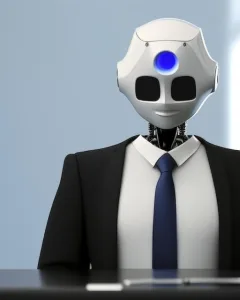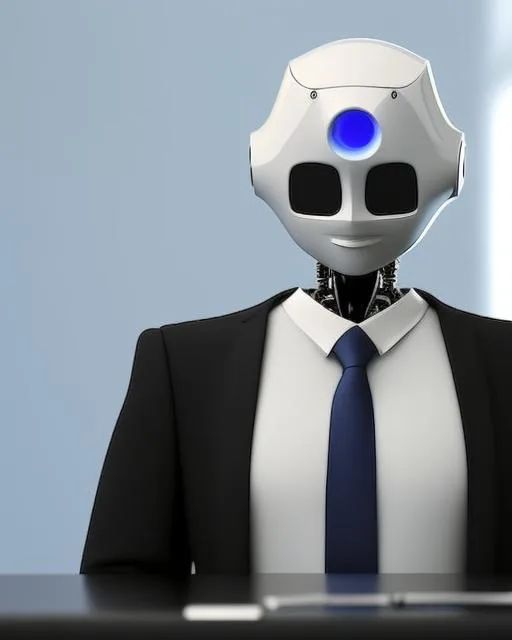Artificial intelligence has been advancing at such an exponential rate that it’s becoming increasingly difficult to deny its potential impact on the job market. With the release of GPT-4, the most powerful AI model yet, it’s clear that the robots are at our doorsteps, and it looks increasingly likely that AI will take your job.
While many Artificial Intelligence experts suggest that AI will create more jobs than it will eliminate, others are convinced drastic effects on employment rates across different industries are inevitable. If the latter group is correct, then this may have serious implications for our economy and society.
In this article, we take an in-depth look at the potential impact of AI on jobs today, exploring both sides of the argument to present an informed analysis of what lies ahead. Get ready to shed light on why AI might take your job and how it could affect you soon – because even if it never does, you should stay informed and be prepared for any possibility.
The Impact of AI on Employment
 As technology progresses and artificial intelligence (AI) continues to develop, the job market and employment landscape are rapidly shifting. With AI-powered machines beginning to take on repetitive, routine, or manual tasks formerly done by humans, many jobs in manufacturing, customer service and even administrative and financial roles will be uprooted or replaced with machines soon. As these automated processes become more reliable, efficient, accurate and cost-effective than traditional manual human labour, it is likely that the use of robots in the workplace will become increasingly common.
As technology progresses and artificial intelligence (AI) continues to develop, the job market and employment landscape are rapidly shifting. With AI-powered machines beginning to take on repetitive, routine, or manual tasks formerly done by humans, many jobs in manufacturing, customer service and even administrative and financial roles will be uprooted or replaced with machines soon. As these automated processes become more reliable, efficient, accurate and cost-effective than traditional manual human labour, it is likely that the use of robots in the workplace will become increasingly common.
For those seeking employment within industries that are being heavily affected by AI and automation, it is necessary to ensure they have the technical skills required for working with advanced technologies. Building expertise in technical fields, such as data science or software engineering, has become a priority for many workers. This will enable them to gain a competitive advantage over those without such qualifications or experience with emerging technologies.
Although some individuals may feel threatened by the development of AI in their workplace because of worries about job security and replacement by machines, there are opportunities arising from this trend. Working alongside robots can also create new opportunities for people who can work together with both humans and machines. For example, a business may hire a technician to maintain complex robotic technology to ensure optimal performance at all times because of disruptions or flaws which robots lack the capacity yet for self-correction and recovery from errors if left unattended.
Therefore, businesses should focus on how changes in the job market associated with increased automation can lead to improved efficiency and productivity gains along with cost savings for organisations across different industries; whilst individuals should also strive towards developing valuable technological competencies that enable them to remain competitive amongst an increasingly tech-savvy population pool of prospective employees. In summary, it is important that we invest heavily in developing high quality technical capabilities so as not to be left behind because, no matter how much you don’t like it, at some point AI will take your job!
Benefits of AI Adoption
As AI continues to be adopted on an industrial level, workers must be prepared to learn about and embrace the technology to remain competitive in the job market. Despite the fear that AI adoption may lead to job losses, automation can come with a range of benefits for companies. From increased accuracy and improved productivity to more efficient operations, AI is transforming the way workplaces function across many industries.
AI also has the potential to benefit employee quality of life as mundane tasks become automated and it frees up employees to pursue more creative endeavours. By reducing human involvement in decision-making processes, AI could also speed up corporate decision making significantly. Businesses that leverage AI, such as chatbots for customer service, will reduce waiting times and enhance customer satisfaction levels.
Ultimately, businesses must stay aware of rapidly developing technologies, such as artificial intelligence, if they want to keep pace with their competitors in their markets or risk falling behind swiftly changing global trends. Companies should replace current manual activities with advanced automation tools like bots powered by artificial intelligence in order to ensure a future level of efficiency and customer service excellence that would otherwise not be possible without it. With this in mind, embracing rather than shunning the usage of AI can provide immense value for both employers and employees alike.
Industries with Significant AI Impact
 A significant number of jobs are rapidly being replaced by Artificial Intelligence technology. We have already seen automation in industries such as manufacturing and healthcare, with automated machinery and robots being responsible for large-scale job losses. Though these industries have already gone through restructuring to accommodate this technological shift, there are still many areas which are yet to experience the full force of AI applications.
A significant number of jobs are rapidly being replaced by Artificial Intelligence technology. We have already seen automation in industries such as manufacturing and healthcare, with automated machinery and robots being responsible for large-scale job losses. Though these industries have already gone through restructuring to accommodate this technological shift, there are still many areas which are yet to experience the full force of AI applications.
Some of the upcoming industries affected by AI include transportation, construction, and the food service industry. Autonomous vehicles are currently undergoing testing with the intention of eventually becoming fully operational on public roads and highways, while we can enhance other processes and services in these industries through device automation.
More jobs will be displaced due to AI implementation in the years to come. As a result, it is important for individuals to understand how AI will affect their own chosen fields and be prepared with the relevant expertise and skills needed to work successfully in increasingly intricate positions tailored for computers and robots.
Societal Implications of Widespread AI Adoption
The automation of jobs through AI has worrying potential negative implications for society, namely the increase in unemployment rates, furthering of existing inequalities and biases and the disruption of local or even global economies. However, these can be handled responsibly by governments and industry leaders working together to mitigate such after-effects while taking advantage of this high-tech revolution.
To begin with, the automation of jobs due to AI could lead to dramatic increases in unemployment worldwide, leading to economic instability. This could affect businesses operating in areas that employ large portions of their population as workers lose their job because of automation and don’t have technical skills to take on engineering, programming or data analyst roles within those companies. It is thus essential for countries to create public policies that not only adequately expect but also properly tackle the displacement of certain jobs due to AI technologies.
It is important to stress out that artificial intelligence systems are themselves subject to algorithms based on human decisions, which means they can perpetuate existing societal biases when employed without proper control protocols in place. For example, discriminatory rules implemented during machine learning could lead to biased decisions regarding access to opportunities for people from protected groups, such as gender or race. Therefore, care must be taken when introducing new designs into AI so as not to code existing disparities into automated processes at scale.
Finally, it should be remembered that this advancing technology isn’t only detrimental but introduces a welcome change where humans are freed up from strenuous roles, allowing them more free time while smart machines handle repetitive work tasks; making better use of human potential while concentrating operations involving analysis, innovation and judgment on humans themselves, indirectly creating new employment opportunities in a tech-heavy world. The timely actions must therefore guarantee both the mitigation of automation’s more destructive effects and harnessing its advantages sooner rather than later.
Conclusion
Ultimately, AI will be responsible for a lot of jobs disappearing. To counter this, individuals must stay ahead of the curve and be prepared to build the specialised skills necessary to take on technical jobs in AI-oriented fields. Those already working in manual labour roles should take steps towards increasing their competency and upskilling so they may become more resilient against automation.
The aim should not be to resist the integration of AI into various industries, but to embrace it as an efficient problem-solving tool when used to complement human labour. Governments and local authorities play a role in motivating companies to use ethical business practices that prioritise knowledge growth rather than profits from mass automation solutions. Education also has a big part to play in ensuring that people stay informed about developments within AI, as well as lessons learning from previous adopters’ experiences.
There is no denying that AI will have far-reaching effects on the job market, both positive and negative; yet with proper regulations and safeguards in place, businesses and civilian populations alike can benefit from its potential applications. Only by embracing new technologies while safeguarding against any potential negative affects can we ensure that further automation isn’t at odds with society’s best interests, making sure everyone is protected by providing equal opportunities for all.
